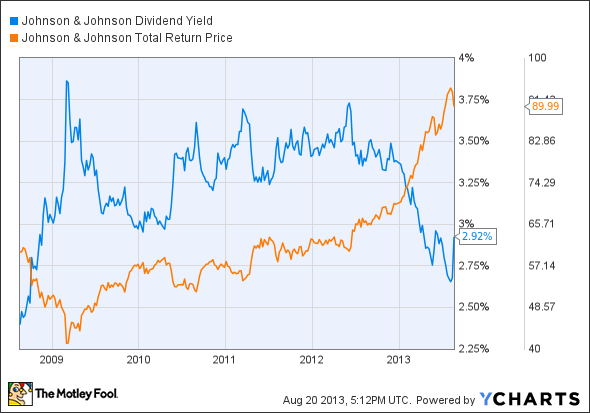The wealth-building power of compound interest will never cease to amaze me. It's a story of patience and attention to detail, where small, short-term differences add up to massive divergence over decades. And in the end, the biggest winners don't always deliver the fattest share-price returns.
Today, I'm looking at the dividend history of health care all-arounder Johnson & Johnson (JNJ 2.27%).
Among the 30 components of the Dow Jones Industrial Average (^DJI 0.62%) index, J&J's 2.9% yield ranks just above the middle. It's the 13th-most generous dividend yield on today's Dow, not far from the 2.7% average yield.
But that's an unusual position for the maker of Splenda, Band-Aids, and Tylenol. Johnson & Johnson typically offers far higher dividend yields, and the reason for the currently modest payout is one most investors would never complain about:
JNJ Dividend Yield data by YCharts.
That's right -- Johnson & Johnson's dividend looks ordinary because the stock price is skyrocketing. Dividend-adjusted share prices have jumped 37% over the last year, behind only three other Dow stocks. The Dow itself has enjoyed a historical run in 2013, but that's just a 13.5% rise in 12 months.
JNJ Total Return Price data by YCharts.
The company has boosted its dividend checks by an average of 11.3% over the last 10 years, and it has done in the most consistent way possible. The chart for this long-term trend is downright beautiful to income investors.
JNJ Dividend data by YCharts.
Shareholders reap the rewards of J&J's generous dividend policies in the long term. The stock has largely kept pace with the Dow's total gains in the last decade, but reinvested dividends provided a serious rocket boost. Using the SPDR Dow Jones ETF (DIA 0.66%) as a proxy for dividend reinvestments in the Dow, this is what you get:
For income investors with a yen for market-beating long-term results, Johnson & Johnson is pretty much the ideal Dow stock to own. This is a rare combination of respectable share-price returns, generous dividend increases, and rock-solid fundamentals -- yes, even when measured against the elite club of Dow members.










